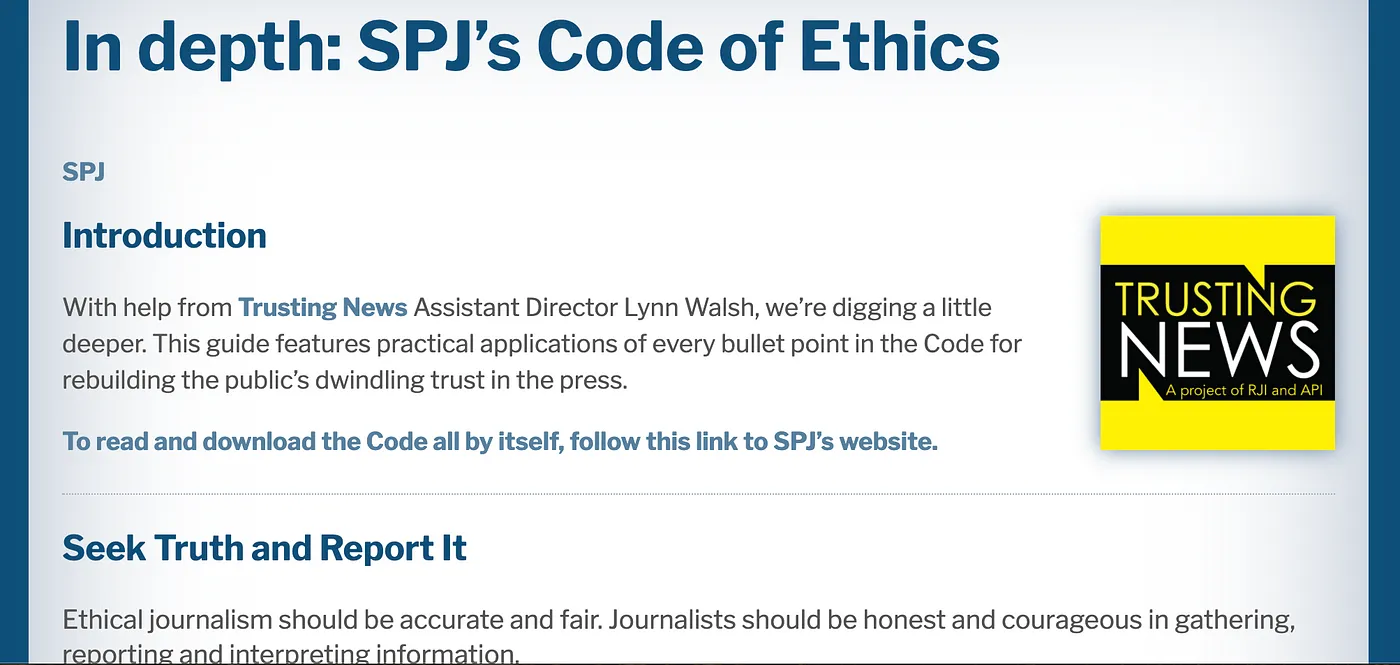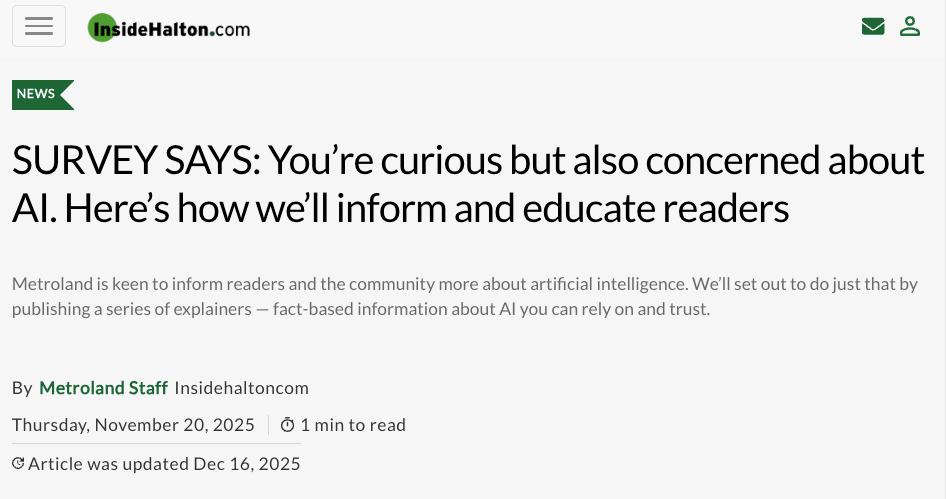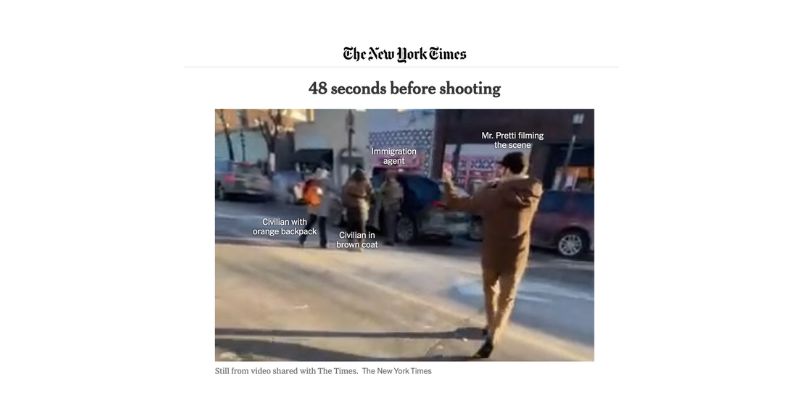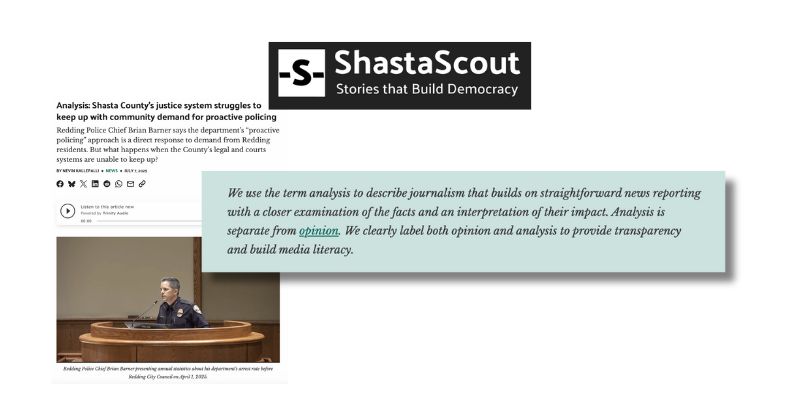
Do journalists have solid ethics? It’s a question that, depending on who you ask, will probably result in very different answers. Ask a room full of journalists, and they will probably say, “of course we do.” Ask a group of students (something I do often) and you’re likely to get mixed answers — eventually landing […]
People don’t assume journalists have ethics. Here’s how you can highlight yours.
Do journalists have solid ethics?
It’s a question that, depending on who you ask, will probably result in very different answers.
Ask a room full of journalists, and they will probably say, “of course we do.” Ask a group of students (something I do often) and you’re likely to get mixed answers — eventually landing on something like, “I think so?” Ask non-journalists in your community, and it’s probably some “yes” and a lot more “no.”
We know that there are standards, principles and rules that serve as the ethical foundation for what we do. But most people aren’t aware of them, much less able to describe them. We have to stop assuming people will give us credit for being thoughtful and careful in our reporting. We have to explain our decisions to them in ways that are relevant to the content they’re consuming.
That’s why Trusting News has partnered with the Society of Professional Journalists for an in-depth look at how journalists can use SPJ’s Code of Ethics to build trust with their communities. It’s part of SPJ’s recently launched “Ethics Central.”
SPJ’s Code is one of the most widely used and referenced resources for journalistic ethics. It’s taught in schools, referenced by journalists and has been built upon by many newsrooms as they create their own ethical codes and standards. I’ve relied on it in my own work and also have served as Ethics Chair for SPJ, in addition to a term as the organization’s national president.
The code is broken into four parts:
- Seek Truth and Report It
- Minimize Harm
- Act Independently
- Be Accountable and Transparent
Within each of these four sections, there are statements about what journalists should do in order to publish and gather information in an ethical manner.
Trusting News has taken each of these statements (35 total) and given examples and ideas about how journalists can talk publicly about each of those statements.
Access all of those ideas and examples here.
Below are a few examples of what you’ll find in this project:
SPJ Ethics Code element:
Remember that neither speed nor format excuses inaccuracy.
Connect ethics to trust:
If a story is breaking, explain the limitations and processes unique to a breaking news story within the story itself. This can be added as an editor’s note at the top or in the intro or tag of a story. Explain to users that information may change, you’re reporting only information you can confirm, you may not have all the answers, etc. Also, explain how and where the story will be updated. If you make a mistake and get something wrong, correct it and admit the mistake. Explain how it happened and what you are doing to prevent it from happening in the future. Also, make sure people know how to contact you about a correction request. This process should be easy to find and navigate. It’s also a good idea to make your corrections policy public.
SPJ Ethics Code element:
Identify sources clearly. The public is entitled to as much information as possible to judge the reliability and motivations of sources.
Connect ethics to trust:
Be sure to explain who the source is and how you got in touch with them. Simple details like “said in an email” or “said on a phone call” provide details to the user to help them better understand and trust how the story was put together. Consider adding shaded boxes or longer bios for your sources throughout the story or at the bottom of a story.
SPJ Ethics Code element:
Support the open and civil exchange of views, even views they find repugnant.
Connect ethics to trust:
Create and publish community guidelines for your social platforms, comment sections and any other events or spaces where you host conversations. Allowing and providing a space for debate and conversations within a community should be a goal for all journalists. But, there are limitations to what can be tolerated otherwise the conversation space isn’t productive. Having community guidelines allows you to moderate the space and help ensure a respectful and productive environment for the community.
As journalists, we make decisions based on these standards every day, probably multiple times a day. But we rarely share any part of those decisions with our audiences. We just make them. Sometimes we consult with others in the newsroom, and sometimes it’s a quick conversation with an editor or producer or photographer. But it too often stops there. Then we are left frustrated or annoyed by an email from a user criticizing the fact that a story published yesterday is now out of date or didn’t include the name of the victim’s family member, and now they think we are biased or trying to hide information.
By explaining how we work to be fair, accurate and ethical, we can let our community into our process, filling the information gap about how news works, which will help us eliminate these negative assumptions that lead to distrust.
Let’s get on the record and make it known that journalists DO have ethics. We follow them closely and take ethical reporting seriously.
Remember this as well: Plenty of news outlets do not follow the ethical principles the rest of us hold dear. For any complaint about unethical journalism, we could find examples to back it up. Our job isn’t to defend our entire industry. It’s to show what makes OUR work credible.
With this new resource, we hope by seeing how you can talk about each element of SPJ’s Code of Ethics, you will be more likely to explain your decisions in your reporting. And remember, these explanations work best when linked, mentioned or included within the story they relate to.
So, bookmark this webpage and the next time you are about to go on-air with a story or hit “publish,” click on it and see if there is an opportunity to explain your ethics.
At Trusting News, we learn how people decide what news to trust and turn that knowledge into actionable strategies for journalists. We train and empower journalists to take responsibility for demonstrating credibility and actively earning trust through transparency and engagement. Learn more about our work, vision and team. Subscribe to our Trust Tips newsletter. Follow us on Twitter and LinkedIn.

Assistant director Lynn Walsh (she/her) is an Emmy award-winning journalist who has worked in investigative journalism at the national level and locally in California, Ohio, Texas and Florida. She is the former Ethics Chair for the Society of Professional Journalists and a past national president for the organization. Based in San Diego, Lynn is also an adjunct professor and freelance journalist. She can be reached at lynn@TrustingNews.org and on Twitter @lwalsh.



